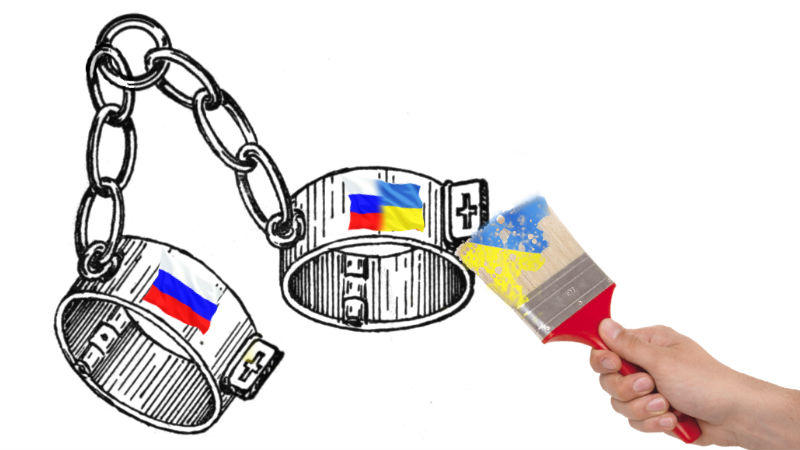
Images mixed by Tetyana Lokot.
Ukrainian Internet users were in for an unpleasant surprise at the end of last week when a member of the Ukrainian parliament suggested bloggers in Ukraine should be required to verify information in their posts and disclose their personal data to the authorities.
Vasyl Petyovka, an MP from Western Ukraine who got into parliament through a majority constituency vote, submitted a draft amendment to the law on information on February 12. The amendment seeks to regulate online blogger activity and imposes a host of restrictions on Internet users.
Петьовка вирішив "врегулювати блогерів", бо "пишете тут всяке в своїх інтернетах"! Коротко: http://t.co/CxcLBollBa pic.twitter.com/Loinod76cx
— andrii bashtovyi (@nomoreanry) February 15, 2015
Petyovka has decided to “regulate bloggers,” because “you all write all kinds of things in your Internets”! Here's the scoop.
Journalists and social media users were immediately alarmed with the amendment and its suggestions. Among other things, the draft defines a “blogger” as an “owner of a website and/or a webpage on the Internet that publishes mass information.” Essentially, any Internet user could fall under that description.
Petyovka's draft amendment insists there is too much unverified information online, so all bloggers should be held responsible for fact-checking and verifying any information they publish, just like mainstream mass media.
The amendment also suggests censoring profanity in Ukrainian blogs, and banning bloggers from “using their website to conceal information of public importance,” though the MP does not offer any explanation as to what that information could be or how a blog or site could be used to “hide” information.
Finally, the draft amendment requires bloggers to publish their full names and electronic addresses on their pages, so that government officials or law enforcement could easily get in touch.
Understandably, many Ukrainian Internet users saw striking similarities between Petyovka's suggestions and a certain blogger law that has already come into force in Russia.
@watcher_com_ua @ukrpravda_news Депутат украiнський, а закон росiйський.
— Андрей (@asputnyk) February 16, 2015
The deputy is Ukrainian, but the law is Russian.
All through the weekend, the Ukrainian blogosphere was roiling with discussions and condemnations of the blogger amendment, with users speaking their mind in the comments to news stories, on Twitter and on Facebook.
Apparently, the strong words users had for the MP and the level of attention from mainstream media had their toll on Vasyl Petyovka. On February 16 he announced he was withdrawing the draft amendment. The MP said his intent was not to restrict the activity or rights of bloggers and claimed he only wanted to protect the Ukrainian web from provocations and disinformation coming from “fake bloggers and Kremlin bots,” at whom the draft was supposedly aimed.
Я не можу не зважати на громадську думку. Якщо юристи, експерти, журналісти вбачають в цьому законопроекті загрозу для свободи слова, значить він не повинен потрапити до сесійної зали і стати законом. Саме тому, цей документ буде відкликано мною з Верховної Ради.
I can't ignore the public opinion. If lawyers, experts, journalists see the draft amendment as a threat to freedom of speech, then it shouldn't go to the Parliament and become a law. This is why I'm going to withdraw the draft from the Verkhovna Rada.
Social media users remained skeptical of Petyovka's real intent, but praised the online community for their quick reaction and credited the social media buzz for the amendment's withdrawal.
Петьовка отозвал переписанный слово в слово с рашисткого "закона о блогерах" законопроект. Друзья, вместе мы сила. Всем спасибо за участие
— Адепт Истины (@adept_istiny) February 16, 2015
Petyovka has withdrawn the draft amendment, copied word for word from the Russist [Russian] blogger law.
Friends, together we're powerful. Thank to everyone for participating.
The Ukrainian government has had a difficult time making information policy decisions while engaged in a military confrontation with Russian and pro-Russian forces in the East, and an information war with Russia. At the end of last year, the creation of a new Ministry of Information Policy was questioned by the public, who dubbed it the “Ministry of Truth.” As Ukraine struggles with issues of censorship, propaganda, and information security, it falls to active Internet users and free speech advocates to act as barometers of free expression and to send signals to the state when it abuses its privileges.








3 comments
Perhaps this law is an attempt to protect the Ukrainian web against pro-pukin trolls who are very numerous and perform what is called “injecting information”. For example, a troll writes: “I heard that rebels develop a successful attack…I’m not sure, though…” A typical method for spreading rumors, read any book about the Spanish Fifth Column.
RuSSian media picture the West as the major villain in the Ukrainian situation; do you think they are transparent and unbiased? You referred to some sites in your post, then here you have another post: en.censor.net.ua, an insider’s view.
RuSSian economy is in an a**hole because of being based almost exclusively on natural ressources; could you name any manufacturing branch there (producing good quality staff, of course, not a bad copy-paste of obsolete Western cars)?
“Ukrainian nazis” is a typically trollish phrase; turn on your brain, invent something original.